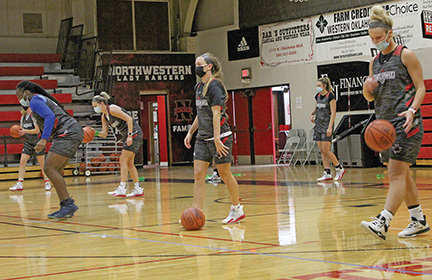by David Thornton, Student Reporter
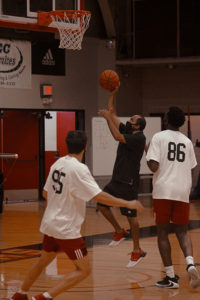
With disappointment in the air for athletes, members of Northwestern’s coaching staff still have opportunities to continue coaching and allow teams to compete this year.
Northwestern’s coaches say they have maintained positive attitudes toward continuing the rest of their seasons, regardless of them being delayed.
Unlike most NCAA programs that have gone online and canceled competitions, Northwestern is still on campus and plans to play sports.
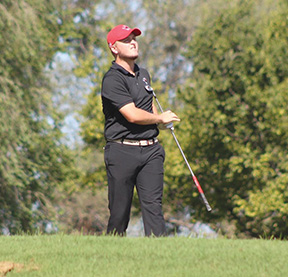
Here is a look at how coaches are adapting to the reality of delayed athletic seasons.
SOCCER
“I wish we were playing this fall,” said Alex Piekarski, the head woman’s soccer coach. “But we are blessed to be here.”
Piekarski and his players were aware of the possibility of soccer being delayed. They were disappointed when the news came, but they expected it, he said.
“I told my team just hours after I got the news,” he said. “We had a team meeting that night, and it put a damper in our first meeting. We have some savvy and intelligent women on our team, and they saw the trends going on in other leagues.”
Piekarski said his team will be able to play in the spring.
“We are preparing to play games in February and March, and our team is excited for it,” he said.
The team’s training sessions for the season are simple and short, and Piekarski said he is making sure they are fun.
“Our ladies are happy to be back doing soccer again,” Piekarski said.
He said players will be doing a lot of physical testing, speed testing and skill testing. He hopes to see improvement from his players later in the year.
To start off Piekarski’s first season at Northwestern, his most important goal is to see his players show real passion for the game, and to see that they are being the best they can be both on and off of the field.
It’s “not a lot of competing against the opposition this year, but competing against ourselves,” he said.
FOOTBALL
Kentrez Bell, the Northwestern football team’s wide receiver coach, is the newest member of the football coaching staff. As a senior at Northwestern in 2019-2020, he played as the team’s wide receiver.
For the football coaching staff, the past month has been “unpredictable,” Bell said.
The delay of the football season put a pause on Bell’s first experiences of being a coach.
“I was honestly torn by the decision on the season being pushed back because they cancelled it a couple days before we were able to start practicing and getting things going,” he said. “I was excited to see the game from the coach’s viewpoint.”
The news that the season had been delayed took a toll on team members, Bell said.
“To hear that they came back to school to not get to play ball – I know it’s tough,” Bell said.
Fortunately, Bell said, the season is not over. Coaches continue to meet with players two times a week to talk about football and read playbooks.
“We have weightlifting three times a week to keep their bodies in shape, and we allow time for the players to come run routes and throw,” Bell said.
MEN’S BASKETBALL
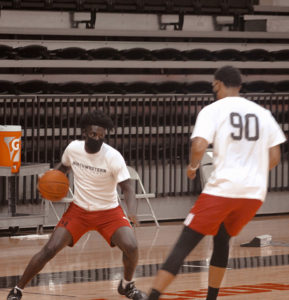
“We have a chance to have a really fun season,” said Vinay Patel, the head coach of the men’s basketball team.
Aug. 14 was when Patel got the news of the season’s delay. Regardless of the men’s basketball season being delayed, Patel said he still has high expectations for his team. Patel said he knows he has a good group of players this year.
“Initially, they were disappointed,” Patel said when asked about how his team took the news of the delayed season.
Patel said he made it clear to his team that this was the best way to ensure the team’s eligibility for the season. He reassured his players they will play the same number of games they had scheduled prior to the changes.
“That information made them feel a lot better,” Patel said.
The team is practicing on the court together, doing things as safely as possible by wearing masks, practicing social distancing, and not using contact play until further notice. Players are using this time to “perfect the details of our offense and defense, and better our individual game,” Patel said.
Patel said he would use one word to describe the past month for him and his program: proactive.
“I’ve challenged our staff to be proactive instead of reactive,” he said. “Be ahead of problems and make sure we are doing what’s best for our kids.
WOMEN’S BASKETBALL
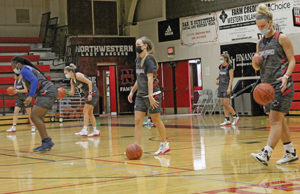
“We received the news about the season being moved a couple of days before classes started when the girls were moving in,” Tasha Diesselhorst, the head women’s basketball coach, said. “I had a feeling this was a possibility, so I was not surprised.”
With things changing daily during the pandemic, you have to prepare yourself mentally for just about anything, she said.
Diesselhorst said she made sure to tell her team about the news before they heard it on social media. That was important, she said.
“We told the team on a Zoom meeting, and they were very positive in dealing with the news,” she said. “I am very proud of how this group has responded to the season being moved.”
The women’s basketball team comes in ready to work each day, she said.
“You wouldn’t know by watching them in workouts that their season is so far away,” Diesselhorst said.
With this extra time, team members are just having fun and working on getting to know each other. They are excited to have the opportunity to be in the gym practicing, she said.
“This team has really impressed me thus far,” she said. “Their energy and passion for the game shows every day. They are a great group of girls that I look forward to seeing improve as the year goes on.”
TRACK AND FIELD/
CROSS COUNTRY
According to Jill Lancaster, the head cross country coach, members of the track and field team as well as the cross country teams were all asking one question: “What are we doing next?”
When the news came around to the team, Lancaster said she appreciated how the Great American Conference and university officials handled the news.
“Looking out for our student athletes is superb,” she said. “And our communication is excellent here.”
Lancaster said she reminded her teams that this delay does not change their goals, though the training cycle will change.
“We are a youthful team, and in all honestly, these training cycles will pay off for them,” Lancaster said. “We get better and better every year.”
Lancaster said she sees this as a big benefit. At the same time, it takes some of the stress of competition off of the players so they may better themselves as athletes.
“Olympians train all year but compete two or three times, and that’s for a reason: to expand their training cycle by accomplishing a lot more in training,” Lancaster said.
Lancaster said she is looking forward to seeing personal growth from her athletes this year. Lancaster said she is also looking for maturity and growth in her players.
“You have a purpose,” she said.
The opportunity to keep in-class education going is “pure-joy,” Lancaster said.
VOLLEYBALL
Days before school began was when Fredrick Aubuchon, the head volleyball coach, received the disappointing information: Volleyball was delayed until late September.
At first, he was highly concerned, and he questioned how practices would go.
“We had really good communication with our team very early,” Aubuchon said.
Aubuchon said he tried to be as transparent as possible with his team.
“As more news came in, it was a lot less shocking to them because we prepared them,” he said. “We never wanted them to be surprised.”
Aubuchon said the pandemic is a “first” for everyone, so no one knows the correct way to conduct preseason and the season in general.
“As coaches, we all talk, but we all don’t know the answers,” he said. “We just hope. Our focus is to just take care of the day.”
It’s hard to do that when you see other universities playing, he said, but the athletic department trusts that officials are doing the right things to keep people safe.
Aubuchon said he is “reminding our team there is going to be a tomorrow, and there is going to be a season, just in the spring.”
“So right now, let us focus on today,” he said. “Our focus is being better at volleyball.”

